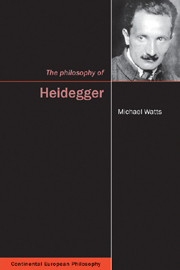Book contents
- Frontmatter
- Contents
- Preface
- Abbreviations
- 1 Heidegger's life
- 2 The meaning of life: the question of Being
- 3 The central ideas in Being and Time
- 4 Conscience, guilt and authenticity
- 5 Being-towards-death
- 6 Dasein's primordial temporality
- 7 The “truth of alētheia” and language
- 8 Heidegger on poetry, poets and Hölderlin
- 9 Heidegger on art
- 10 Heidegger on technology
- 11 Tao, Zen and Heidegger
- 12 Heidegger's politics
- Glossary
- Further reading
- Bibliography
- Index
12 - Heidegger's politics
- Frontmatter
- Contents
- Preface
- Abbreviations
- 1 Heidegger's life
- 2 The meaning of life: the question of Being
- 3 The central ideas in Being and Time
- 4 Conscience, guilt and authenticity
- 5 Being-towards-death
- 6 Dasein's primordial temporality
- 7 The “truth of alētheia” and language
- 8 Heidegger on poetry, poets and Hölderlin
- 9 Heidegger on art
- 10 Heidegger on technology
- 11 Tao, Zen and Heidegger
- 12 Heidegger's politics
- Glossary
- Further reading
- Bibliography
- Index
Summary
Heidegger's politics, and the debate as to whether his philosophy lends itself readily to Nazi ideology, is normally considered central to reading and interpreting his thought. Some thinkers, however, rejecting any suggestion of the “ad hominem argument” linking the life and work, suggest that Heidegger's personal political views and behaviour be regarded as philosophically insignificant, because a philosophy and moral character exist independently: “Being an original philosopher … is the result of some neural kink that occurs independently of other kinks … Philosophical talent and moral character swing free of each other” (Rorty 1998: 32–3). This standpoint tries to evaluate Heidegger's thinking on its merits while rejecting one of Heidegger's fundamental convictions – that thinking and meaning derive from one's concrete experience of being-in-the-world – which implies that “authentic” philosophizing arises from authentic existence (although this does not necessarily mean that others will view an “authentic existence” as morally acceptable).
Although Heidegger was not a political philosopher in the traditional sense, most people accept that we cannot completely segregate his life and work; first, because of the sheer enormity of the regime's crimes against humanity, and second, because after the war, even after the full horrors of the Holocaust had been exposed, Heidegger still never expressed openly real guilt or deep regrets over his actions. Indeed, he made great efforts to vindicate himself using a variety of highly questionable excuses, inspiring Polt to assert: “It is hard to avoid the conclusion that Heidegger's postwar self-interpretation is cowardly and self-deceptive.
- Type
- Chapter
- Information
- The Philosophy of Heidegger , pp. 245 - 262Publisher: Acumen PublishingPrint publication year: 2011

